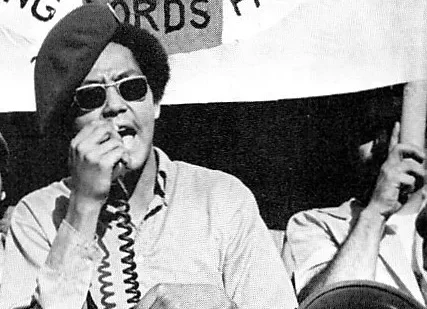Black Puerto Rican Had New York Street Cred
Blacks Led Whites in Supporting Cease-Fire:
One in 4 Blacks: U.S. Should Play No Role in Conflict
New SPJ Leader Discloses Plans to Erase Red Ink
NABJ-Philly: Show Them Journos ‘Are Just Like Everybody Else’
Rosaylnn Carter Focused on the Underserved
Why These Journalists Give Thanks
Nancy Ancrum, Miami Editorial Page Editor, Retiring
Another Blow to Accessing Police Scanners
Weatherman Steve Pool, 70, Dies of Alzheimer’s
Nguyen Qui Duc, Multitalented, Dies in Homeland
Short Takes: Wave of j-training for underrepresented groups; Ibram X. Kendi; Alexi McCammond; Khambrel Marshall; Buffy Sainte-Marie; CPJ’s International Press Freedom Awards honorees; Brazil’s ex-president pays fine to journalists after court ruling; Brazil’s most admired Black journalist; Burkina Faso wants to conscript journalists; Ghana’s increase in abuse of journalists; Ghana soldiers attack and detain journalist; prolonged detention of journalist in Sudan.
Journal-isms Roundtable photos by Sharon Farmer/sfphotoworks.
Support Journal-ismsDonations are tax-deductible. On Facebook, please support Journal-isms Inc. for Giving Tuesday, Nov. 28.
Pablo Guzmán says in this 2009 WCBS-TV clip that when he rode in the press car covering the newly freed Nelson Mandela, an African diplomat asked him about John Gotti, the infamous New York crime boss who Guzman had covered. (Credit: WCBS/YouTube)
Black Puerto Rican Had New York Street Cred
Pablo “Yoruba” Guzmán, a New York television, radio and print journalist who in the early 1970s had been minister of information of the Young Lords, a New York Puerto Rican “revolutionary” group inspired by the Black Panther Party, died Sunday after a heart attack in a suburban Westchester County, N.Y., hospital, Young Lords co-founder Mickey Menendez told Journal-isms. Guzmán was 73.
Guzmán had long been ailing and was complaining of chest pains while at Cedar Manor Nursing & Rehabilitation Center in Ossining, N.Y., Menendez said, then was transferred to the emergency room in Phelps Hospital in Westchester County, where he suffered the heart attack and died.
Guzmán summarized his career on LinkedIn: “I started in radio when I was 18. Over the next 43 years, audiences saw me grow as I expanded into print, and television news. They know me; and, trusted me. People opened up, even in the most difficult moments. Viewers also know I have a humorous side. And that I have taken them to the worlds of music, politics, sports, neighborhoods, film, and law enforcement.”
Guzmán’s background in the Young Lords helped make him “the best street reporter on TV,” his friend Juan Gonzalez, the journalist who is another of the four co-founders of the Lords, told Journal-isms. “He was really, really popular. Because of his work in the Lords he had great sources — mobsters, people from all walks of life.”
Added Melendez, “His being minister of information — very few people can get out of bed in the morning and [instantly] be on camera and be on cue.”
Ricky Flores, a photojournalist and fellow Puerto Rican responded to a tweet from Gonzalez on X, formerly Twitter. “A great brother, always a pleasure to work along side him while covering stories for our orgs. A role model of what it means to work in an industry that actively tried to muzzle POC voices, and doing it from the inside, he did it with class and style.”
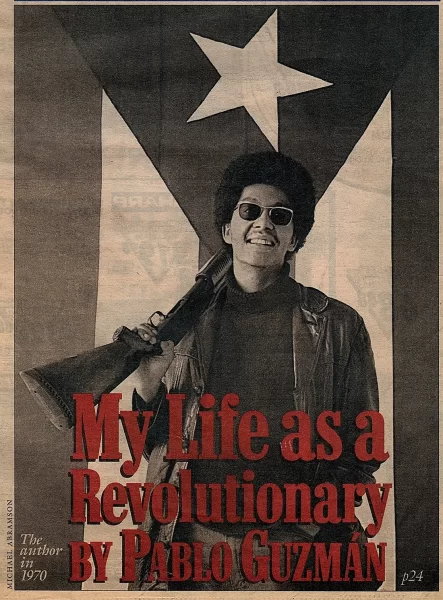
Guzmán worked at WCBS-TV, WNEW-TV and WNBC-TV in the nation’s top media market, wrote for the alternative weekly the Village Voice, and hosted a radio show on Black-owned WBLS-FM before becoming self-employed in 2013, the year that a blood clot in his leg kept him off the air.
Guzmán had previously cheated death in a car crash and suffered a heart attack, this column reported in 2008.
Guzmán was one of the few Black Latinos to graduate from the selective Bronx High School of Science and had reflected publicly on being Black and Latino.
Guzmán titled a 2016 essay, “Before People Called Me A Spic, They Called Me A Nigger.” In it, he discussed racism in the larger society and among Latinos.
He closed with, “We have that slave ship in common. Why run away from that now? We’re the ones that landed and survived. Even today we’re learning more about the African roots in places like Vera Cruz in Mexico. In parts of South America where we thought the African touch was minimal. Somos familia.
“But the engine for a better day, then, and now. Is picking up where the civil rights marchers left off. Building on Malcolm, Stokely, Rap, the Panthers. My boy Bob, a Black classmate at college, and I went to the Panther office in Harlem to join up. And were scared shitless. These women and men were intense. We didn’t think we were ready. Several months later we were starting our own group. A mainly Puerto Rican group. With other Latinos. And Blacks. Including Bob. Inspired by the Panthers. That is, militant. Pero con mucha salsa.“ [“But with a lot of sauce.”]
- Martha M. Arguello, ReVista, Harvard University: Sisters, Brothers, Young Lords (Jan. 14, 2009)
- Amy Goodman with Juan González, Carlito Rovira, Denise Oliver-Velez and Johanna Fernández, “Democracy Now,”: The Young Lords: Exploring the Legacy of the Radical Puerto Rican Activist Group 50 Years Later (July 24, 2019)
- Pablo Guzmán, Medium: A Lord of the Barrio (Feb. 15, 2016)
- Pablo Guzmán, NBC News: Opinion: Anger Is Overflowing on Puerto Rico’s Crisis (Sept. 29, 2017)
- Neyda Martinez Sierra, The Latinx Project, New York University: Past is Present: The Young Lords Party Revisited (Dec. 15, 2021)
Blacks Led Whites in Supporting Cease-Fire
Nov. 25, 2023
Joe Federman, Associated Press news director for Israel and the Palestinian Territories, explains the temporary cease-fire agreement to facilitate the release of dozens of people taken hostage during Hamas’ raid on Israel and the allowance of humanitarian supplies for Gaza. (Credit: Associated Press/YouTube)
One in 4 Blacks: U.S. Should Play No Role in Conflict
In a survey nearly three weeks after the Hamas terror attack against Israel, 43 percent of Black Americans were supporting some form of a cease-fire, versus 35 percent of white Americans, and 95 percent of Blacks rejected the idea of unwavering support for Israel, while only 77 percent of whites did.
After an international clamor, such a pause is now in effect. “Hamas released a second group of hostages on Saturday night, the Israeli military said, after an hourslong delay raised fears that a fragile truce in Gaza could collapse altogether. Israel was expected to release Palestinians prisoners within hours,” The New York Times reported Saturday evening.
 The figures on attitudes toward a cease-fire were part of a preview of a survey by the Carnegie Endowment for International Peace presented Sunday at the Journal-isms Roundtable. They were delivered by Christopher Shell (pictured, by Sharon Farmer), a fellow in Carnegie’s American Statecraft program, who introduced himself as having “done extensive surveys looking at Black American opinion on some pressing foreign policy issues like the war in Ukraine, looking at opinion on issues like US.-China relations, so on and so forth.”
The figures on attitudes toward a cease-fire were part of a preview of a survey by the Carnegie Endowment for International Peace presented Sunday at the Journal-isms Roundtable. They were delivered by Christopher Shell (pictured, by Sharon Farmer), a fellow in Carnegie’s American Statecraft program, who introduced himself as having “done extensive surveys looking at Black American opinion on some pressing foreign policy issues like the war in Ukraine, looking at opinion on issues like US.-China relations, so on and so forth.”
At the end of the survey, taken Oct. 20-25 among 800 Black and 800 white respondents, was this question, Shell said: “How would you rate the media’s coverage” of the Israeli-Hamas conflict?
“And what’s quite interesting is equal shares of Black and white Americans. . . . 30% say that they’re not sure,” he continued.
“They’re very unsure about how the media is covering the conflict. So I’m trying to think through this; whether it means that they don’t know they can trust the media and they don’t, maybe they’re not watching the media at all. . . .
“But what was also quite interesting as well was that Black Americans are more likely than white Americans to think that the media is providing fair coverage to both sides.
“So, 29 percent of Black Americans said the media is providing fair coverage of both sides. 19 percent of white Americans said so.”
However, the survey also showed, “Black Americans are slightly more likely, 35 percent, to believe that the media is providing more coverage in favor of Israel versus 31% of white Americans, and then, on the question of Palestine, only 7 percent of Black Americans think that the media is providing coverage favorable of Palestine versus 20 percent of white Americans.”
Forty people attended the Journal-isms Roundtable by Zoom, with 60 more having watched on Facebook by Thanksgiving day, and 85 more saw it on YouTube before the video was taken down temporarily on Tuesday for editing.
Sunday’s primary speaker was Malcolm Nance, the former counterintelligence agent, author and former MSNBC commentator. Toasts were raised to the new NABJ-Philadelphia chapter of the National Association of Black Journalists, and to Ashanti Blaize-Hopkins, new president of the Society of Professional Journalists, the first Black woman in the role. NABJ-Philadelphia was represented by chapter president Michael Days, vice president Melanie Burney and other chapter leaders.
In other survey findings, Shell said 24 percent of Black Americans told survey-takers that the United States should not be involved in any way in the Israeli conflict, versus about 19 percent of white Americans.
Also, 65 percent of Black Americans said, “I pretty much feel the same about [President] Biden,” after the president’s initially unequivocal support for Israel, but 20 percent of independent Black voters and young voters said they felt worse about Biden in the wake of the attack.
- Ofer Aderet, Haaretz: Tanzanian Man Whose Body Was Recently Identified Was Killed on Oct. 7, Not Kidnapped as First Reported
- Zeeshan Aleem, MSNBC: As Gaza burns, the old Democratic playbook on Israel is becoming risky
- Hannah Allam and Mohamad El Chamaa, Washington Post: Many in Middle East blame United States for devastation in Gaza
- Perry Bacon Jr., Washington Post: The movement against Israel’s bombing of Gaza is bottom-up leadership (Nov. 3)
- Charles M. Blow, New York Times: The Question of Anti-Zionism and Antisemitism (Nov. 15)
- Stacy M. Brown, Washington Informer: Black America Divided Over Hamas’ Attack on Israel, Raises Questions on Solidarity (Oct. 18)
- Fabiola Cineas, Vox: The long, complicated history of Black solidarity with Palestinians and Jews (Oct. 17)
- Committee to Protect Journalists: At least 57 Perry Bacon Jr., Washington Post: The movement against Israel’s bombing of Gaza is bottom-up leadership (Nov. 3) killed in Israel-Gaza war
- Gerren Keith Gaynor, theGrio: What should Black Americans make of Israel-Hamas war? (Oct. 11)
- Amanda Michelle Gomez and Dee Dwyer, DCist: ‘Our Struggle Has Been United’: Why Local Black Activists Are Backing Palestinians In Their Calls For A Ceasefire (Nov. 16)
- Jasmin Gueta, Haaretz: Israel’s Communications Minister Threatens Haaretz, Suggests Penalizing Its Gaza War Coverage
- Jason Lange and Matt Spetalnick, Reuters: US public support for Israel drops; majority backs a ceasefire, Reuters/Ipsos shows (Nov. 15)
- Bassem Mroue and Abby Sewell, Associated Press: Israeli airstrikes on Lebanon kill 2 journalists for a pan-Arab TV channel, 4 Palestinian militants
- Ruben Navarrette Jr., syndicated: Americans support Israelis and Palestinians in the Mideast war (Oct. 20)
- Andrew Romano, Yahoo: Poll: More Americans now want U.S. to push for ceasefire than to continue ‘supporting’ Israel’s war against Hamas (Nov. 16)
- Reporters Without Borders: Repression of journalists in Israel: RSF calls for an immediate end to pressure and intimidation (Nov. 15)
- Reporters Without Borders: Israel is eradicating journalism in Gaza, with ten reporters killed in three days, 48 since start of war (Nov. 18)
- Reis Thebault, Washington Post: Palestinian Americans face fear, violence amid Israel’s war in Gaza
- Robin Washington, Forward: Let’s celebrate all freed hostages, not just Israeli citizens
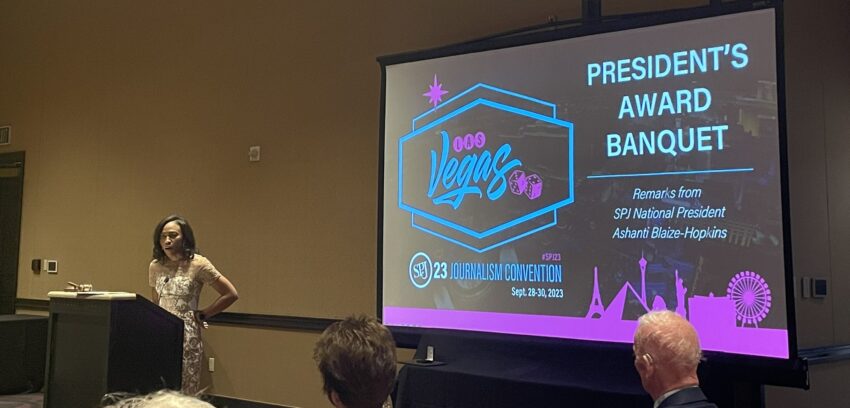
New SPJ Leader Discloses Plans to Erase Red Ink
The Society of Professional Journalists, on track to end the year $301,000 in the red, canceling its 2024 convention as a result, plans to rejuvenate with a hefty loan from its foundation and hiring a new executive director, new president Ashanti Blaize-Hopkins told the Journal-isms Roundtable Sunday. SPJ has already hired a new director of fundraising, she said.
“Our foundation has 12 million dollars in the bank. So we have been negotiating with them really since our convention that happened in September,” Blaize-Hopkins, the first Black woman in the president’s job, said.
“Me personally, I have engaged with the president of the foundation board probably three times — three or four times a week, we have conversations, and so they are planning a pretty significant reinvestment plan that would infuse a significant amount of money. . . . We are on the right path to being able to right the ship.” Blaize-Hopkins also sits on the foundation board.
As for the director of fundraising, Blaize-Hopkins messaged afterward that the choice “is actually a little non-traditional. We hired the Metropulos Group.
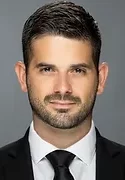 “Lucas Metropulos (pictured), the co-owner of the company has the official title of SPJ Fundraising Director.”
“Lucas Metropulos (pictured), the co-owner of the company has the official title of SPJ Fundraising Director.”
The group’s website says, “We plan and execute fundraising initiatives that support your organization or school. These include capital and endowment campaigns, annual fundraising, and interim management services.“
The SPJ News reported Sept 29, as SPJ held its annual conference, “According to the Monthly Financial Summary, so far SPJ is positioned with a $96,000 deficit for the year. After the conference, a projected deficit of $191,000 budget is anticipated.
“A big contributor to the financial dilemma is the dependence on membership loyalty. In the first quarter, SPJ earned $149,839 through membership dues, but that number plummeted to only one-fifth, $29,733, in the second quarter. So far, SPJ has ended up with $196,000 in revenue after taking account of July and August. On the other hand, the projected budget for membership dues is up to $350,000,” wrote Chinanu Okoli, James Naylor, Laura De la Garza Garcia, Rachel Andriacchi and Tianrui Huang.
 As Angela Fu wrote in October for the Poynter Institute, “The society bills itself as ‘the nation’s most broad-based journalism organization’ and is most well-known for its code of ethics. As a 501(c)(6), SPJ advocates for journalists and the First Amendment. It is separate from the SPJ Foundation, which is a 501(c)(3) charity that accepts tax-deductible donations and works to support the society and other journalism organizations. . . .”
As Angela Fu wrote in October for the Poynter Institute, “The society bills itself as ‘the nation’s most broad-based journalism organization’ and is most well-known for its code of ethics. As a 501(c)(6), SPJ advocates for journalists and the First Amendment. It is separate from the SPJ Foundation, which is a 501(c)(3) charity that accepts tax-deductible donations and works to support the society and other journalism organizations. . . .”
Blaize-Hopkins is interim associate dean at the Center for Media and Design at Santa Monica College. She told the Roundtable, “When I was inducted as the president of SPJ, one of the things that I said in my speech was I am my ancestors’ wildest dream. And that’s never lost on me that when I am in spaces that I’m not historically supposed to be, I have to take up space, I have to use my voice, and I have to make sure people . . . know that I’m there for a reason. And so I don’t take on any role unless I feel like I can be impactful. And that is one of the reasons why I decided to run for vice president, which turns into president of SPJ. . . .”
 In looking for a new executive director, Blaize-Hopkins (pictured) said, “We have kind of a two-phased process, where the person that we choose initially will be someone who has some gravitas in the industry, someone who may be a former dean of a journalism program or a former executive director of a journalism organization that can kind of come in and right the ship and put us on a very solid path, the sustainability of our organization. And then that person after two years can help us find someone that is going to be a more long-term permanent executive director for the organization.
In looking for a new executive director, Blaize-Hopkins (pictured) said, “We have kind of a two-phased process, where the person that we choose initially will be someone who has some gravitas in the industry, someone who may be a former dean of a journalism program or a former executive director of a journalism organization that can kind of come in and right the ship and put us on a very solid path, the sustainability of our organization. And then that person after two years can help us find someone that is going to be a more long-term permanent executive director for the organization.
“We’ve also just hired a director of fundraising who has put together a pretty comprehensive development plan for our organization as well.
“So, you know, we are on the right path to being able to right the ship. And I think . . . at this point in time, my biggest thing is anything that happened in the past, any of the issues that may have arisen between our two boards, we have to let that go, because if we can’t figure out a way to work together and also work in collaboration with other journalism organizations, we won’t survive. And so, you know, I credit all of the folks that I’ve been working with at national . . . they have kind of accepted that and we’re moving forward in a very positive direction, where we’re able to get things done.
“That’s my biggest thing during my one-year term. One year is not a lot of time, but you can make it a lot if you’re focused and you are . . . really paying attention to the things that are going to move the organization forward so that you can get things done for and be in service of not only the industry, but the members that we have, the members that we will likely . . . attract in the future. And for those who maybe may never join our organization.
“But at the end of the day, I think all of the journalism organizations that we have across the nation, we all have a very similar mission and that is to make sure that our industry is able to be sustainable for the next, you know, 100, 200, 300 years because if our industry goes away, democracy is not far behind.”
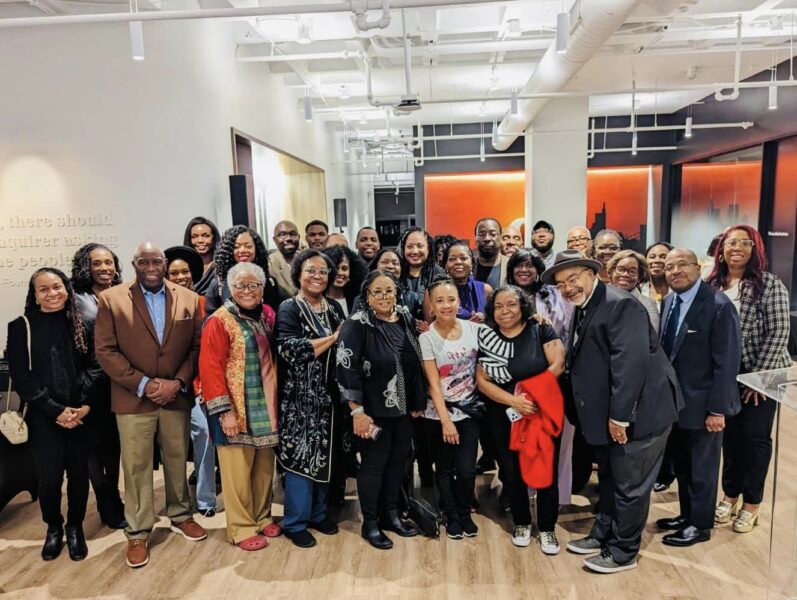
Show Them Journos ‘Are Just Like Everybody Else’
When Michael Days, president of the new NABJ-Philadelphia chapter, was asked whether there were issues particular to Philadelphia that he wanted the new group to address, he mentioned the Pew Research Center’s October study that found “that Black folks, I mean, Black Republicans, Black Democrats, Black old folks, Black young people, say that the media does not portray us adequately, accurately,” in Days’ words.
It’s an issue “I’ve been obsessed with personally and I’m going to push it and push it ahead if I can get the membership to agree with me,” Days (pictured below, at NABJ board meeting, by Curtis L. Brown) went on.
“And so, you know, we’ve all, we’ve all been in cities where, you know, we have these gatherings, these town meetings, to bring people together, all kinds of folks, and talk about how we’re going to fix this.
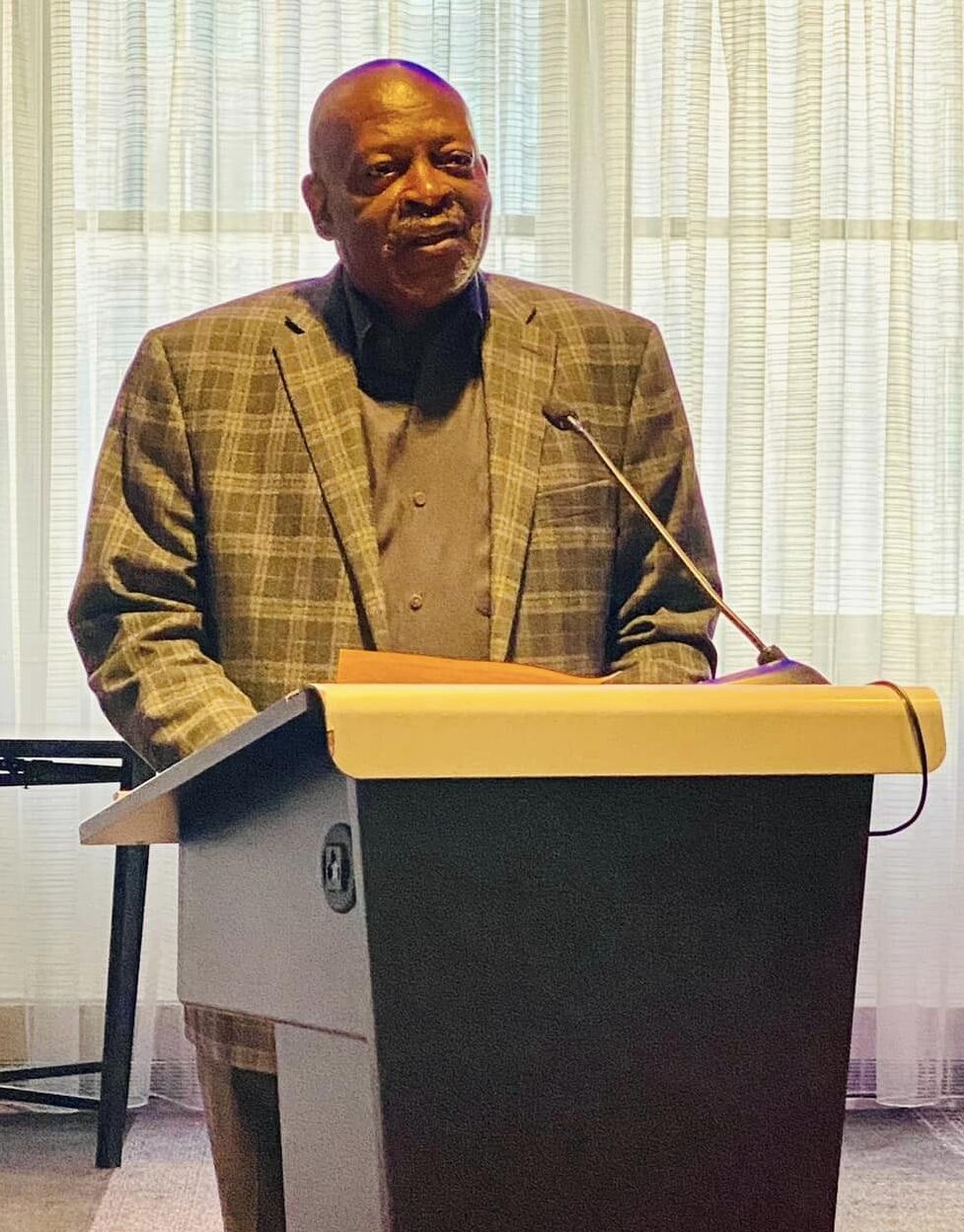 “But we never quite — we clearly don’t get it done, because people are still complaining about it.
“But we never quite — we clearly don’t get it done, because people are still complaining about it.
“One of the things I want us to [do] was sort of a holistic look at, and not a one-term, not a one-meeting thing or two-meeting thing, but begin to work with our various communities. And allow people to see that journalists are like everybody else. And what does that mean?
“That means that we’re going to have to be involved in volunteering for things in the community. We’re going to have to start putting together town hall meetings, not one town hall meeting, but repeatedly doing town hall meetings with the community so they can see we are just like everybody else, so that when we’re out there on a story or working on a story or I need to talk somebody, we know who to talk to. We know that we’re just not people sitting in a office most of the day, or I guess many of us sit home.
“And then have a mic in their face or a phone in their face or notebook in their face when the story is needed. So that for me . . . really developing a much better connection with our community is essential.”
Days, a former masthead member of the Philadelphia Inquirer and Daily News, and a newspaper industry leader, was with chapter Vice President Melanie Burney, Sherry L. Howard and Jenice Armstrong, other leaders of the latest professional chapter of the National Association of Black Journalists. They accepted a toast at the Nov. 19 Journal-isms Roundtable Zoom.
“We’ve always traditionally focused on young journalists and what . . . their needs are,” Days continued.
“And how do we push, pull along. And all that is very, very important. But we all have needs, no matter where we are in our careers.
“And so we want to make those two of the significant priorities. . . .”
NABJ approved the chapter Oct. 26 at a board meeting in Philadelphia. The existing Philadelphia Association of Black Journalists left the national group a year ago and NABJ had suspended the local president for five years.
In the new chapter, all who qualify are welcome, Days said, in contrast to the Philadelphia Association of Black Journalists. In September, PABJ President Ernest Owens said, “PABJ will not be permitting current members to double-dip in forming a rival chapter to our organization simultaneously. We perceive NABJ’s desire to consider forming another local organization as retaliatory and in bad faith. Those who choose to partake in this collaboration with NABJ during our time of institutional friction will not be granted or renewed a membership within PABJ.”
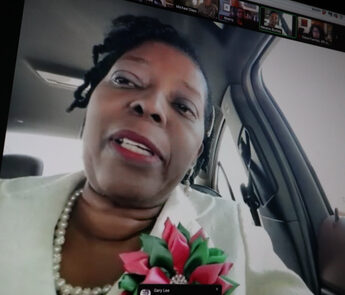 Burney (pictured, by Sharon Farmer) promised a different mindset. “We have busy, busy lives, but this was important to us because we need to restore professionalism, integrity and standards, and what pushed me over the edge was when the former chapter accepted donations from City Council. And for all the Black journalists I know, that’s a no-no.
Burney (pictured, by Sharon Farmer) promised a different mindset. “We have busy, busy lives, but this was important to us because we need to restore professionalism, integrity and standards, and what pushed me over the edge was when the former chapter accepted donations from City Council. And for all the Black journalists I know, that’s a no-no.
“We don’t take money from the very people that we cover. We don’t endorse mayoral candidates and other things and I’m all for glitz and glamour and dressing up and looking beautiful, but we got to do the work too.”
PABJ’s Owens argued at the time the council awarded the $25,000 that “We’re not a news organization,” but a nonprofit.
Burney continued, “And that’s what we want to get back to — is the work of NABJ. So that’s why we join forces to start this new chapter.
“You’re going to see some old programs, but you’re going to see some new and innovative things too.
“So stay tuned. We’ve adopted as our theme song the hit ‘Ain’t No Stopping Us Now.’ ” (audio)
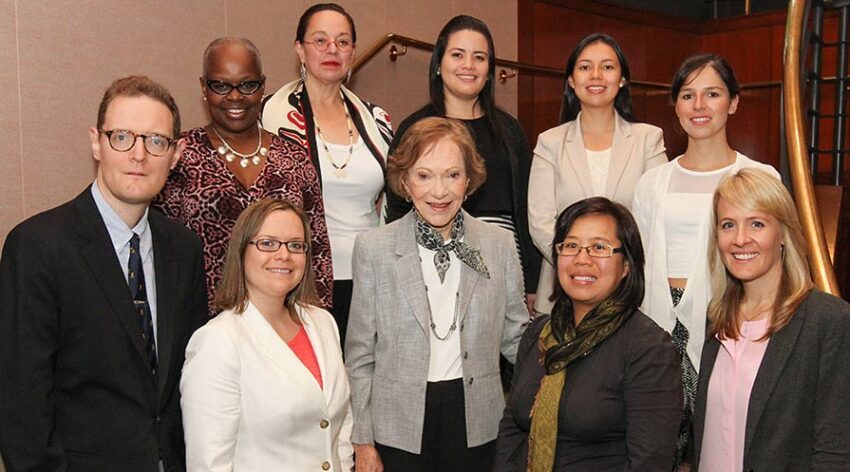
Rosaylnn Carter Focused on the Underserved
“Informed journalists can have a significant impact on public understanding of mental health issues as they shape debate and trends with the words and pictures they convey.”
Those words from the late Rosalynn Carter, who died this week at 96, lead the web page of The Carter Center’s Rosalynn Carter Fellowships for Mental Health Journalism.
“The mental health journalism fellowships program was founded in 1996 by former First Lady Rosalynn Carter based on an essential premise: give journalists the resources they need to report on mental health — one of the world’s most underreported health issues — to help dismantle through storytelling the stigma that millions of people face every day.”
Three past fellows of color shared their reflections.
John Head, writer, editor, communications specialist, author:
 “Mrs. Carter and the staff of the Mental Health Journalism Fellowship program put a lot of time and energy into building up the fellows, convincing us that we were capable of accomplishing the goals we set forth for our projects.
“Mrs. Carter and the staff of the Mental Health Journalism Fellowship program put a lot of time and energy into building up the fellows, convincing us that we were capable of accomplishing the goals we set forth for our projects.
“But at the end of the day, Mrs. Carter reminded us that the work was not about us. It was about those who would be helped by our work. She was especially focused on having impacts in underserved communities where there was a lack of resources and where the stigma attached to mental illness prevented people from accessing the help that was available.
“My project was to write a book about black men and depression based on my own experiences. Thanks to Mrs. Carter and the fellowship program, I got that book written and published. That allowed me to have many conversations that I hope made it possible for black men who otherwise would not have asked for help to ask for help and to get help.”
Yanick Rice Lamb, professor, Howard University:
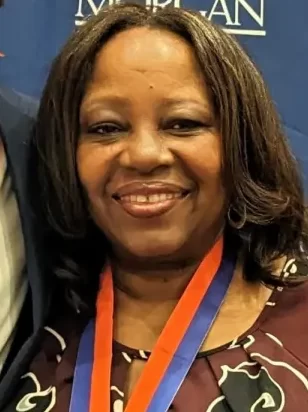 “Mrs. Carter focused much-needed attention on mental health beyond her time at the White House. Through the Carter Center, she provided training for a growing pool of international journalists, research and best practices on covering mental health. We learned a lot from each other. It’s a great fellowship with a supportive staff and mentors.”
“Mrs. Carter focused much-needed attention on mental health beyond her time at the White House. Through the Carter Center, she provided training for a growing pool of international journalists, research and best practices on covering mental health. We learned a lot from each other. It’s a great fellowship with a supportive staff and mentors.”
Katti Gray, writer on health journalism and criminal justice journalism:
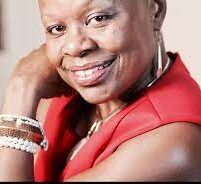 “I’m not sure which was greater, my gratitude for a fellowship that funded my reporting on special programs for incarcerated military veterans with mental health diagnoses or the utter gift of being around the table at the Carter Center as Mrs. Carter held forth amongst us journalists with such depth and grace about this sphere of health and health care that she devoted herself to. She was whip smart. I mean, whip smart! And so kind. Plus, her husband came to hang out with us during those days of orientation in Atlanta.
“I’m not sure which was greater, my gratitude for a fellowship that funded my reporting on special programs for incarcerated military veterans with mental health diagnoses or the utter gift of being around the table at the Carter Center as Mrs. Carter held forth amongst us journalists with such depth and grace about this sphere of health and health care that she devoted herself to. She was whip smart. I mean, whip smart! And so kind. Plus, her husband came to hang out with us during those days of orientation in Atlanta.
“Those Carters? Next to Jesus to me, I swear.
“Past the White House, they’ve lived glorious lives, servants’ lives on so many fronts, including in various parts of Africa. They are such an example for the rest of us.”
- Bill Barrow, Associated Press: Rosalynn Carter made a wrongfully convicted felon a White House nanny and helped win her pardon
- Emil Guillermo, Asian American Legal Defense and Education Fund: Rosalynn Carter’s way, and pardoning your own turkey
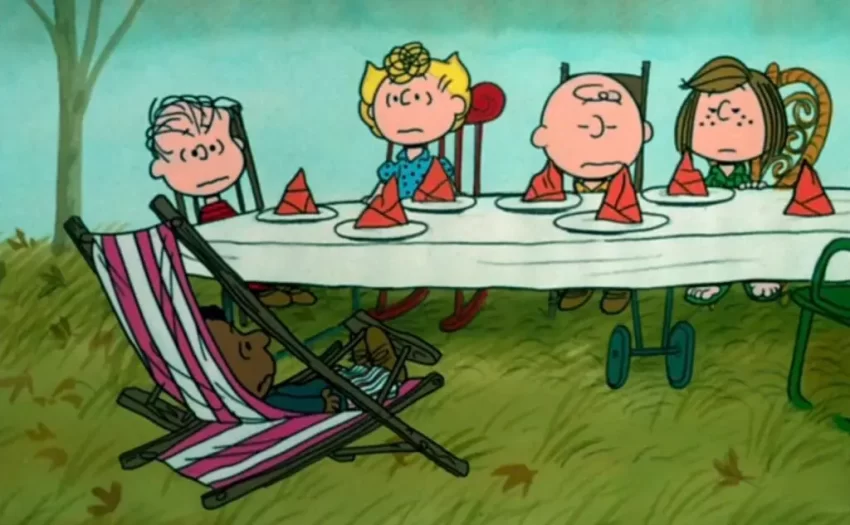
Why These Journalists Give Thanks
“It’s been a year filled with extraordinary challenges and triumphs across the news industry,” Oliver Darcy wrote Wednesday for CNN. “Ahead of the holiday, we reached out to members of the journalism community with a simple question: What are you most thankful for this year?”
Separately, the Indigenous Journalists Association called on news outlets “to move beyond ‘Thanksgiving hot takes’ that perpetuate stereotypes during Native American Heritage month.
“It’s the time of year again when requests flood inboxes of Indigenous journalists, academics, tribal government officials, activists etc. with interview requests from mainstream outlets asking Indigenous people to speak about what Thanksgiving ‘means’ to us, or to set the record straight about the ‘true history’ of the holiday. This type of unethical framing makes Indigenous people only seem to exist to the rest of America during these 30 days and not the other 11 months of the year,” the association said.
Meanwhile, here are some of the responses from journalists of color to Darcy’s question.
► 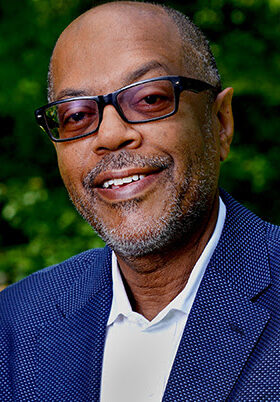 Kevin Merida, executive editor, Los Angeles Times: “I am thankful that journalism continues to demonstrate its value — revealing truths that otherwise wouldn’t be known, enlightening the world and making it better. Story by story.”
Kevin Merida, executive editor, Los Angeles Times: “I am thankful that journalism continues to demonstrate its value — revealing truths that otherwise wouldn’t be known, enlightening the world and making it better. Story by story.”
►  Ramy Inocencio, CBS News foreign correspondent: “Simply, I’m thankful to be alive. Our team just returned from Israel after the last three weeks. On our last day two Hamas rockets were launched toward our filming location in Sderot less than a mile from the Israel-Gaza border. Israel’s Iron Dome intercepted them over our heads. We had no time to find shelter so we all hit the deck and hoped. I’m thankful I’m home, able to hug my husband and our two sons and tell them I love them.”
Ramy Inocencio, CBS News foreign correspondent: “Simply, I’m thankful to be alive. Our team just returned from Israel after the last three weeks. On our last day two Hamas rockets were launched toward our filming location in Sderot less than a mile from the Israel-Gaza border. Israel’s Iron Dome intercepted them over our heads. We had no time to find shelter so we all hit the deck and hoped. I’m thankful I’m home, able to hug my husband and our two sons and tell them I love them.”
► Nilay Patel, editor-in-chief, the Verge: “I am thankful that everywhere I go media people are focused on building and serving their own audiences again, instead of chasing other people’s algorithms. It feels like we’re coming out of a long dark period and trying to build a new kind of web again.”
Nilay Patel, editor-in-chief, the Verge: “I am thankful that everywhere I go media people are focused on building and serving their own audiences again, instead of chasing other people’s algorithms. It feels like we’re coming out of a long dark period and trying to build a new kind of web again.”
► 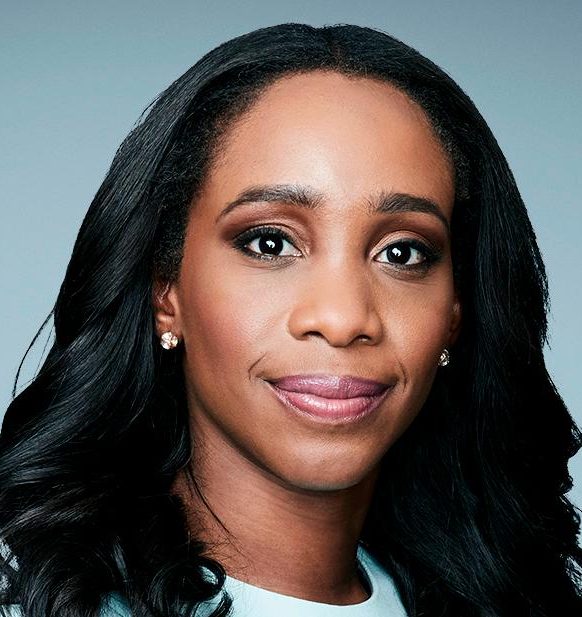 Abby Phillip, CNN anchor: “I’m thankful for the constant of my family — with all the joy, quirks and frustrations that come with it. No matter what happens in my professional life that’s still the most important thing. This year, we’ve been blessed with life and good health. I can’t ask for more. I’m also grateful for my work family — my ‘NewsNight’ team — who have been extraordinary in a year of a lot of change in this industry!”
Abby Phillip, CNN anchor: “I’m thankful for the constant of my family — with all the joy, quirks and frustrations that come with it. No matter what happens in my professional life that’s still the most important thing. This year, we’ve been blessed with life and good health. I can’t ask for more. I’m also grateful for my work family — my ‘NewsNight’ team — who have been extraordinary in a year of a lot of change in this industry!”
► 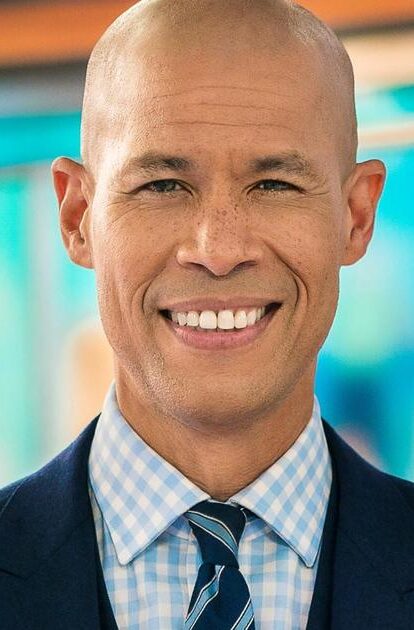 Vlad Duthiers, correspondent, CBS News: “This is the first Thanksgiving my wife Marian and I are celebrating with our 9-month-old daughter Céline. I’m thankful for them and their love. I’m also thankful for our families who are all in good health and thriving. Finally, I’m thankful I have a career that I love and that I get to work every day with some of the best journalists in the world — many who are often in harm’s way. It’s a dream come true.”
Vlad Duthiers, correspondent, CBS News: “This is the first Thanksgiving my wife Marian and I are celebrating with our 9-month-old daughter Céline. I’m thankful for them and their love. I’m also thankful for our families who are all in good health and thriving. Finally, I’m thankful I have a career that I love and that I get to work every day with some of the best journalists in the world — many who are often in harm’s way. It’s a dream come true.”
► 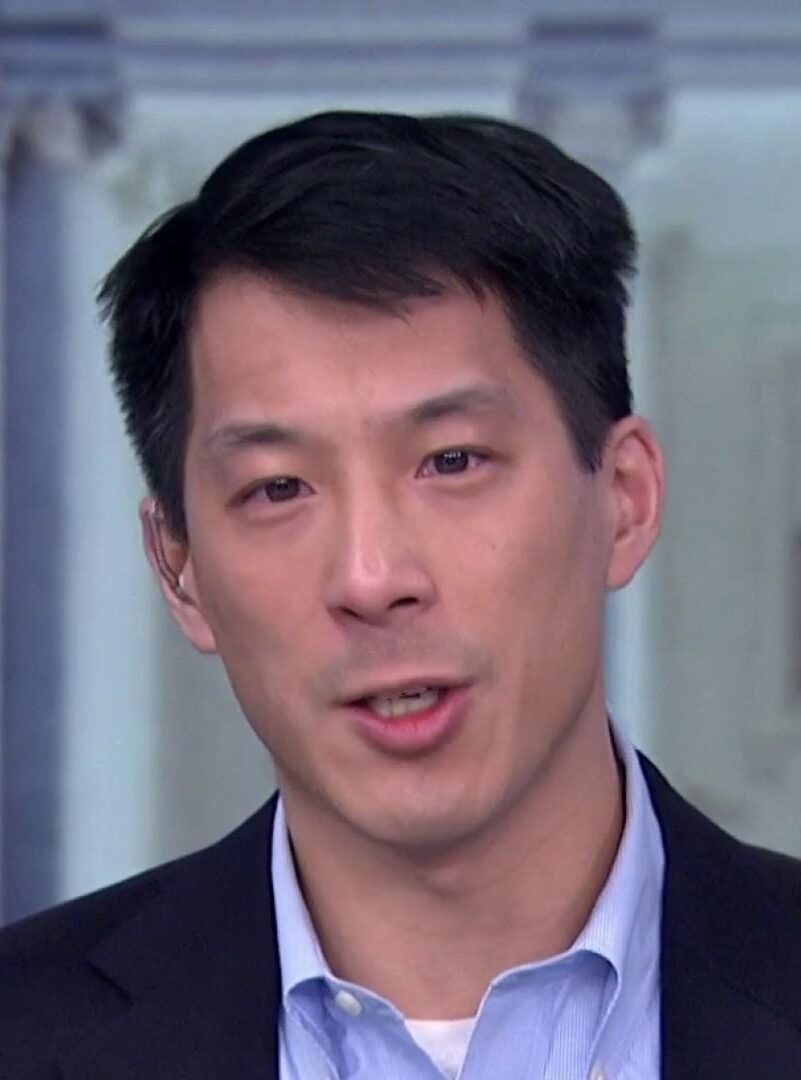 Michael Luo, editor of NewYorker.com: “For more than two years, I’ve been working on a book— in my early mornings, late evenings, and on weekends — about the history of Chinese exclusion in America. I’ve written far too many words, but I really do believe that, this Thanksgiving weekend, I will finish the last chapter. So I’m thankful that I can at least see the end. There’s still a lot of work to do, but it’s there, the finish line.”
Michael Luo, editor of NewYorker.com: “For more than two years, I’ve been working on a book— in my early mornings, late evenings, and on weekends — about the history of Chinese exclusion in America. I’ve written far too many words, but I really do believe that, this Thanksgiving weekend, I will finish the last chapter. So I’m thankful that I can at least see the end. There’s still a lot of work to do, but it’s there, the finish line.”
► 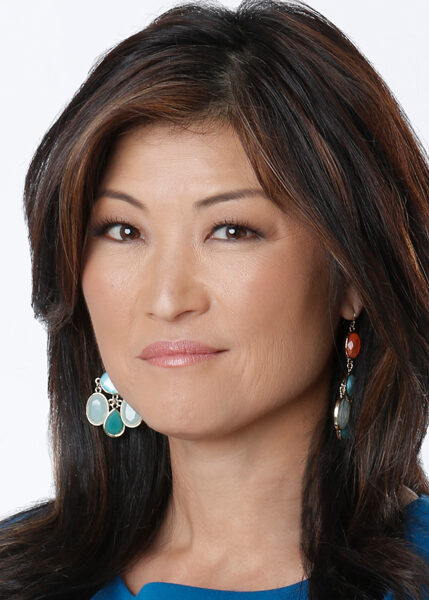 Juju Chang, co-anchor, ABC News “Nightline”: “I’m deeply grateful for all of my families: my work family, my chosen family and my extended family.”
Juju Chang, co-anchor, ABC News “Nightline”: “I’m deeply grateful for all of my families: my work family, my chosen family and my extended family.”
► 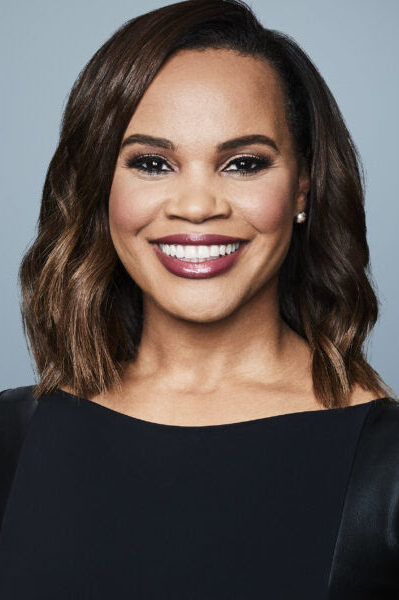 Laura Coates, CNN anchor: “I’m so thankful for the opportunity to have a platform where there’s a chance that the stories I tell will change my children’s lives for the better.”
Laura Coates, CNN anchor: “I’m so thankful for the opportunity to have a platform where there’s a chance that the stories I tell will change my children’s lives for the better.”
- Nika Bartoo-Smith, Underscore News + ICT: UnThanksgiving organizers want to rethink colonial holidays: During a time of year that can be hard for many, especially Indigenous people, community members in Portland are organizing alternatives to ‘Thanksgiving’ and ‘Black Friday’
- Lisa Michelle King, The Conversation: Thanksgiving stories gloss over the history of US settlement: Deceptive and broken treaties forced Native American nations to give up vast portions of their homelands
- Gale Courey Toensing, ICT: What Really Happened at the First Thanksgiving? The Wampanoag Side of the Tale (Nov. 23, 2017, updated Sept. 13, 2018)
- Mónica Marie Zorrilla, The Messenger: ‘A Charlie Brown Thanksgiving’ Racism Controversy, Explained
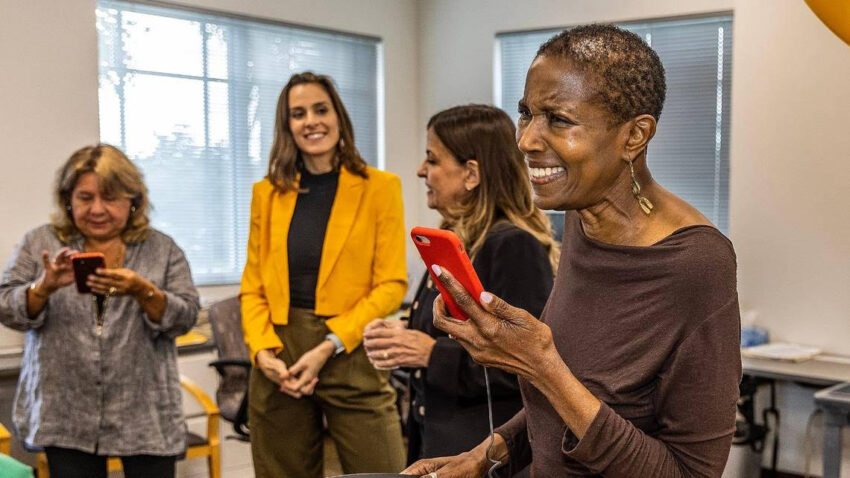
Nancy Ancrum, Miami Editorial Page Editor, Retiring
Nancy Ancrum, one of the few Black women to lead a mainstream newspaper’s editorial page — and an all-female one at that — is retiring after a decade as the Miami Herald’s editorial page editor and 40 years at the Herald, Howard Cohen reported Nov. 18 for the Herald.
“Ancrum, 67, will work through December. Then she will take on a role as an engaged citizen with her beloved husband, George Fishman, a retired mosaic artist and arts writer,” Cohen wrote.
“Alex Mena, executive editor of the Miami Herald and el Nuevo Herald, called Ancrum ‘a Herald legend.’
“ ‘Nancy has been a guiding light for the community, a fierce voice of what’s right and fair,’ Mena said. ‘Many community leaders have endured the sharpness — and wisdom — of her words. As a colleague, Nancy is beloved for her warmth, grace and style.’ “
Cohen also wrote, “She has kept a watchful eye on Florida Gov. Ron DeSantis (some readers may have noticed the Editorial Board has had doubts about the governor) and also launched two opinion newsletters, Miami Debate and Right to the Point, the Herald’s newsletter of conservative viewpoints. And year after year, she embraced the rigorous process of vetting and endorsing local political candidates to help guide voters in our community. . . .
“ ‘I really took this job with a personal and professional mandate to engage an ever-increasing and ever more broad swath of our community of leaders,’ she said. ‘And I think I was able to move that needle and also engage people who don’t read us, but who might listen to us. I’m very proud of meeting people where they are. It was fun. . . . We were informed and that allowed us to inform.’ ”
- Crystal Hill, Yahoo: Deborah Roberts, Kristen Welker and their Black female peers are more visible than ever on TV news. Why experts say this isn’t just ‘a moment.’ (Sept 26)
Another Blow to Accessing Police Scanners
“A new $500 million radio system the New York Police Department introduced this past summer encrypts officers’ communications, meaning the public, including members of the press, will no longer be able to listen in,” Chelsia Rose Marcius reported Sunday, updated Thursday, for The New York Times. “The project will take at least five years to complete, though some frequencies have already gone dark. . . .”
The development is part of a trend that has caused “angst” in the journalism world, as Dan Shelley, president and CEO of the Radio Television Digital News Association, told the Journal-isms Roundtable this summer.
 Journalism groups “are fighting in New York City, fighting in the Bay Area, fighting in Chicago, fighting in small and medium and large towns all across the country to either stop public safety encryption, or allow access to journalists to pull real-time police dispatch information.
Journalism groups “are fighting in New York City, fighting in the Bay Area, fighting in Chicago, fighting in small and medium and large towns all across the country to either stop public safety encryption, or allow access to journalists to pull real-time police dispatch information.
“Ideally we’d love to have the entire public be able to monitor it, not because we want to chase violent crime on the scanner for sensational purposes, but because police have become, and I’m — this is a broad generalization, it’s not true everywhere — but in many, many, too many places across the country, law enforcement agencies have become much less transparent in the last two to three years than they ever were before.”
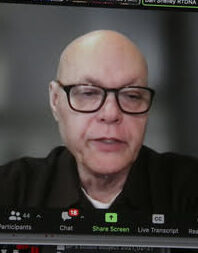 Shelley (pictured) also said, “It’s happening because police — it’s not always the stated reason; the reason they most often cite is, ‘Well it’s for officer safety.’ Journalists don’t want access to police scanners to compromise officer safety. We want to know for ourselves as best we can determine what’s going on in neighborhoods, neighborhoods of color, and other neighborhoods.
Shelley (pictured) also said, “It’s happening because police — it’s not always the stated reason; the reason they most often cite is, ‘Well it’s for officer safety.’ Journalists don’t want access to police scanners to compromise officer safety. We want to know for ourselves as best we can determine what’s going on in neighborhoods, neighborhoods of color, and other neighborhoods.
“Because unfortunately, and I hate to say this in some respects, but it is the truth. You can’t always rely on the police narrative.”
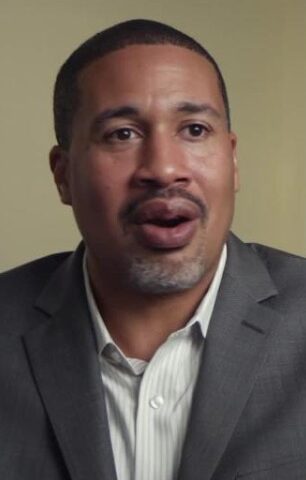 At that July 31 Roundtable, Letrell Crittenden (pictured), director of inclusion and audience engagement at American Press Institute, said the debate over police scanners raises a different issue.
At that July 31 Roundtable, Letrell Crittenden (pictured), director of inclusion and audience engagement at American Press Institute, said the debate over police scanners raises a different issue.
“I agree that there needs to be surveillance of what police [are] doing. I have absolute agreement with you with that,” Crittenden said. “However, the problem is that when . . . if we’re being honest, the police scanner for many newsrooms is the greatest tool of community engagement they have with communities of color. That is the only time they will go into these communities at all.
“So yes, there is the more benevolent reason that you’re seeking to have the scanner. But my point was that in nine out of 10 cases, that scanner is used to go into communities of color and report on Black harm. And in eight out of 10 of those cases, no, it’s no follow-up to try and understand what’s going on.
“So I’m not saying that the police scanners shouldn’t be available, but the problem is how newsrooms use the police scanners and how they use them: At the expense of communities of color and covering . . . more deeply communities of color.”
Shelley agreed and compared that approach to the “if it bleeds it leads” paradigm, which he said also needs to change.
- Ari Paul, Fairness & Accuracy In Reporting: Police Seek a Radio Silence That Would Mute Critics in the Press (Sept. 25)
- Emily Russell, Columbia Journalism Review: Nighttime Scanner (podcast) (July 24)
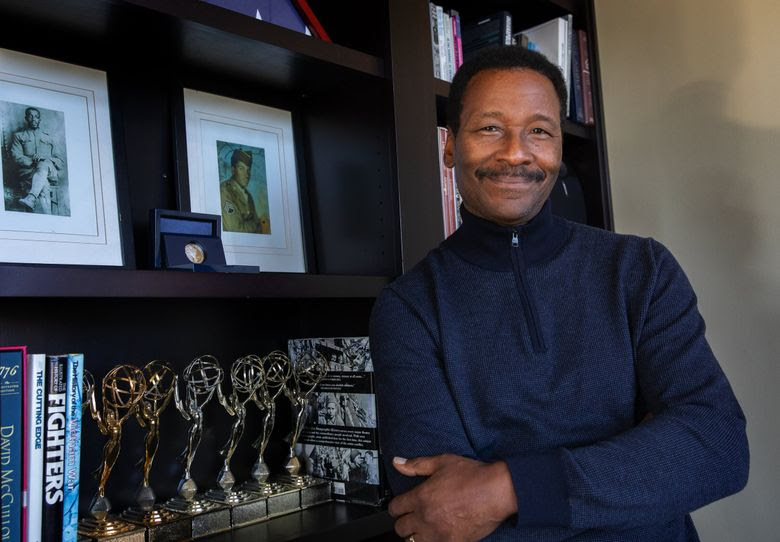
Weatherman Steve Pool, 70, Dies of Alzheimer’s
“Longtime Seattle TV weather forecaster Steve Pool died this week from early onset Alzheimer’s disease, his family said Friday,” Taylor Blatchford and Greg Kim reported for the Seattle Times.
“ ‘We are so blessed to have had him in our lives,’ wrote his wife, Michelle Lee Pool, on his Facebook page. ‘He was an extraordinary man, husband, father and good friend to many. Please know that he truly loved his job and this community and felt so privileged to be a part of your lives.’
“KOMO 4, for which Steve Pool, 70, worked for four decades, said he died Wednesday. . . .
“About a year into his time as chief weather forecaster, his agent called. Would he fill in for ABC’s Good Morning America when their weather person went on vacation?
“ ‘To say I was stunned is a huge understatement,’ Pool wrote on his personal website. ‘My answer? Not just yes but hell yah!’
“He would go on to fill in for Good Morning America more than 70 times over the years. . . .
“In September 2018, Pool was diagnosed with prostate cancer and underwent a year of proton therapy treatment at the Seattle Cancer Care Alliance Proton Therapy Center.
‘Reflecting on his career when he retired in 2019, Pool told The Times he always strived to be an optimist in the newsroom.
“ ‘I always think, “You’re lucky to be doing this job. It’s not easy to get in here,” ‘ Pool said.”
In this 2013 video, Nguyen Qui Duc speaks of his affection for his adopted home, Hanoi’s arts scene and his new bar. (Credit: YouTube)
Nguyen Qui Duc, Multitalented, Dies in Homeland
Nguyen Qui Duc, a journalist, radio host, poet and author who came to the United States from Vietnam as a boat person at age 17 and returned in 2006 to Hanoi, where he operated his own bar, died Wednesday after battling cancer, friends said. He was born in 1958, which would make him about 65, depending on his birthday.
In an interview with NPR in 2015, Michael Sullivan described Duc as an “aging beat poet.” Duc told Sullivan, “I’ve always wanted to come back to live in Vietnam to sort of finish the man that I was meant to be — disrupted, interrupted to go to America and become somebody else, and after about 30 years, I wanted to get back to Vietnam. I wanted to live here.”
The Vietnam Reporting Project begins Duc’s bio with this: “Nguyen Qui Duc has worked in the United States, Indonesia, England, Morocco and other countries for more than 30 years. In 2006 he was appointed senior editor/Asia for KQED Public Radio’s Pacific Time, a national program focusing on Asian and Asian American affairs for which he was the founding host and producer from 2000 to 2006. Now based in Hanoi, Qui Duc is a contributor for The World (WGBH & the BBC) and FRONTLINE/World (PBS). . . . “
A GoFundMe page described Duc as “A writer, poet, pioneering journalist, advocate for refugee communities, award winning documentary filmmaker, political activist, polyglot, bon vivant — Duc is truly one of a kind.“
- Randall Yip, AsAmNews: UPDATED: Radio host & writer Nguyen Qui Duc has died
Short Takes
- A “little-noticed wave of everything from one-day bootcamps to two-year fellowships” is “being started or expanded by modest nonprofits, huge legacy media companies, and professional associations to train aspiring journalists from underrepresented groups — Black, Hispanic, Asian, Indigenous, LGBTQ+ — at the very time when diversity as a goal in education and employment is otherwise a target of the culture wars,” Jon Marcus wrote Nov. 17 for Nieman Reports. Marcus went on to list many of the initiatives.
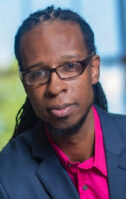 “In the spring of 2022, Ibram X. Kendi (pictured) was recognized as one of the most banned authors in America,” Kalia Richardson reported Wednesday for Rolling Stone. “The National Book Award winner’s passionate reporting on the permeation of racist ideas throughout American history riled up conservative proponents, leading to three of Kendi’s tomes being banned in six school districts across multiple states. Now, his efforts to expose racist ideology [are] the subject of a new Netflix documentary, Stamped From the Beginning. . . . “
“In the spring of 2022, Ibram X. Kendi (pictured) was recognized as one of the most banned authors in America,” Kalia Richardson reported Wednesday for Rolling Stone. “The National Book Award winner’s passionate reporting on the permeation of racist ideas throughout American history riled up conservative proponents, leading to three of Kendi’s tomes being banned in six school districts across multiple states. Now, his efforts to expose racist ideology [are] the subject of a new Netflix documentary, Stamped From the Beginning. . . . “
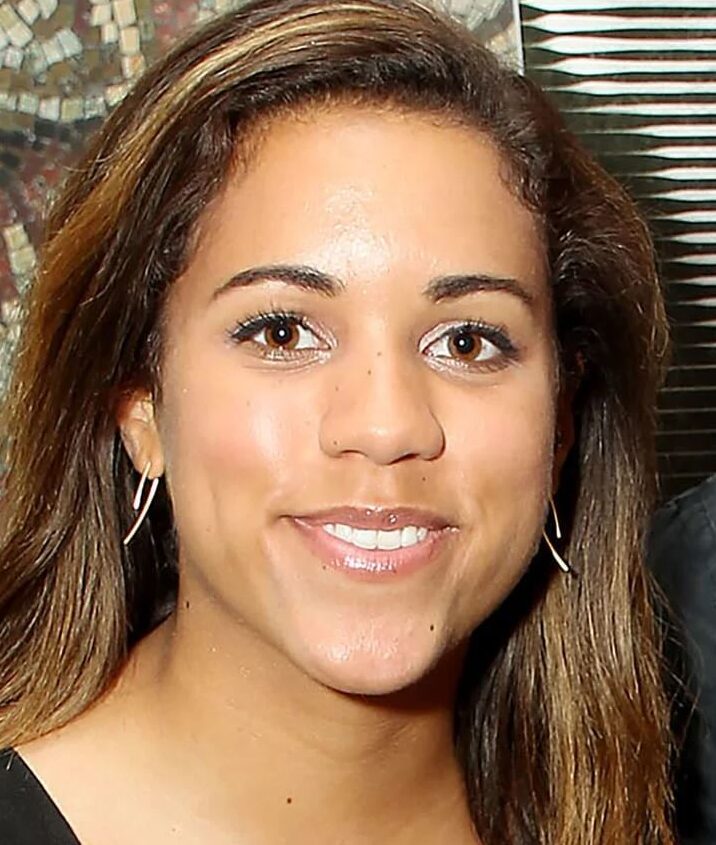 “[President] Biden and his administration worked hard during the pandemic to close the racial vaccination gap, and that’s good,” political writer Alexi McCammond (pictured) wrote Monday for The Washington Post. “But many Black voters are still looking for alternatives, and one of them just so happens to share some of their deep-seated feelings on medicine. President RFK Jr. might not sound too bad to the very folks who put Biden in the White House.” McCammond joined the Post in August, writing on Twitter, now X, “Hello! I’m at the @washingtonpost now after 6 amazing years at @axios with the sharpest minds in media. I’ll still be covering politics — but this time with the stellar @PostOpinions team. So send me your op-ed ideas that you want to read! Or write!”
“[President] Biden and his administration worked hard during the pandemic to close the racial vaccination gap, and that’s good,” political writer Alexi McCammond (pictured) wrote Monday for The Washington Post. “But many Black voters are still looking for alternatives, and one of them just so happens to share some of their deep-seated feelings on medicine. President RFK Jr. might not sound too bad to the very folks who put Biden in the White House.” McCammond joined the Post in August, writing on Twitter, now X, “Hello! I’m at the @washingtonpost now after 6 amazing years at @axios with the sharpest minds in media. I’ll still be covering politics — but this time with the stellar @PostOpinions team. So send me your op-ed ideas that you want to read! Or write!”
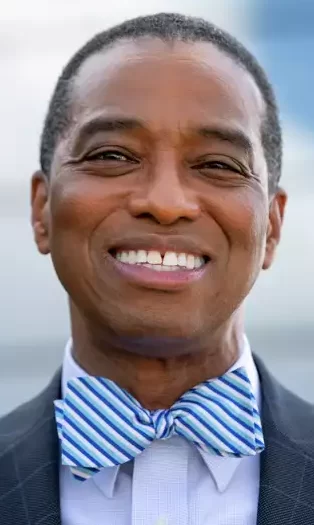 “A longtime Houston meteorologist will soon be signing off the air for the last time,” Ariana Garcia reported Nov. 17 for the Houston Chronicle. “Khambrel Marshall (pictured), who has spent the past 24 years working at KPRC 2 and nearly 50 years in the industry, announced on Friday that he will be retiring to enjoy his life with his wife Debbie, three daughters and three grandchildren. His last day at the channel will be Dec. 13. . . .”
“A longtime Houston meteorologist will soon be signing off the air for the last time,” Ariana Garcia reported Nov. 17 for the Houston Chronicle. “Khambrel Marshall (pictured), who has spent the past 24 years working at KPRC 2 and nearly 50 years in the industry, announced on Friday that he will be retiring to enjoy his life with his wife Debbie, three daughters and three grandchildren. His last day at the channel will be Dec. 13. . . .”
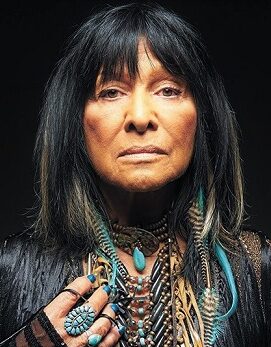 “Buffy Sainte-Marie (pictured) is addressing the claims made in CBC’s The Fifth Estate that she has been fraudulently posing as a Native American over the course of her 60-year career,” Christy Piña reported Wednesday for the Hollywood Reporter. “The documentary episode on the Canadian network series included interviews with Sainte-Marie’s family members who she says she doesn’t know and a birth certificate of hers that she has never seen before. In a lengthy statement, the first Indigenous Oscar winner noted that the network relied on a story fabricated by her childhood abuser and brother, Alan, and two members of her estranged family that she doesn’t know. . . .”
“Buffy Sainte-Marie (pictured) is addressing the claims made in CBC’s The Fifth Estate that she has been fraudulently posing as a Native American over the course of her 60-year career,” Christy Piña reported Wednesday for the Hollywood Reporter. “The documentary episode on the Canadian network series included interviews with Sainte-Marie’s family members who she says she doesn’t know and a birth certificate of hers that she has never seen before. In a lengthy statement, the first Indigenous Oscar winner noted that the network relied on a story fabricated by her childhood abuser and brother, Alan, and two members of her estranged family that she doesn’t know. . . .”
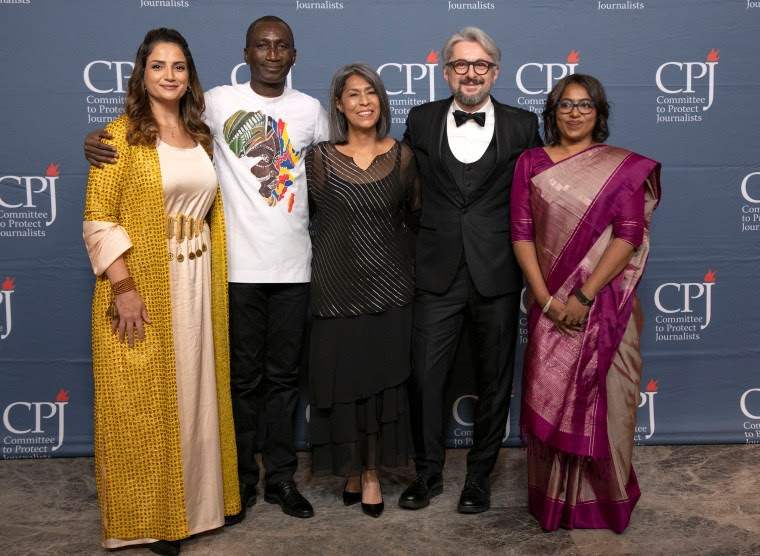
- The Committee to Protect Journalists and press freedom supporters gathered in New York Nov. 17 to celebrate journalists who “have experienced government crackdowns, kidnapping, exile, and the rising criminalization of their work, representing global trends that increasingly challenge press freedom.” The 33rd annual International Press Freedom Awards (IPFA) raised a record-breaking nearly $2.8 million to protect journalists around the world, CPJ said. Awardee Niyaz Abdull, left, is with 2023 IPFA Awardees (second from left to right) Ferdinand Ayité of Togo, María Teresa Montaño of Mexico, Nika Gvaramia of Georgia and Shahina K. K. of India.
- “Former [Brazilian] President Jair Bolsonaro paid this Monday [Nov. 14] a fine of R $72,551.74 [about US $15,000] to the Union of Professional Journalists of the State of São Paulo. The fine is related to a judicial action,” LatAm News reported Nov. 17, quoting CNN Brazil. ” ‘Justice understood that I should be condemned because, during my term in office, I attacked the image and honor of press professionals,’ said Jair Bolsonaro.”
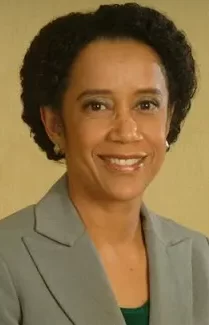 “Zileide Silva (pictured), a senior reporter for Brazil’s Jornal Nacional and TV Globo’s Journalism, was named champion among the most admired Black journalists in the Brazilian press, the Brazilian Press Association announced Nov. 16. “This award, in particular, is very important for us, because when I started in this profession we could count on one hand how many Black journalists occupied this space,” Silva told the 200 at the gala. “She also said that there were times when mothers approached her and revealed that they told their children that, if she was in that position, they could also occupy the same space. For Zileide, this is the main objective of the award, ‘to show how Black people are able to happily occupy these spaces’ ”. (Video in Portuguese)
“Zileide Silva (pictured), a senior reporter for Brazil’s Jornal Nacional and TV Globo’s Journalism, was named champion among the most admired Black journalists in the Brazilian press, the Brazilian Press Association announced Nov. 16. “This award, in particular, is very important for us, because when I started in this profession we could count on one hand how many Black journalists occupied this space,” Silva told the 200 at the gala. “She also said that there were times when mothers approached her and revealed that they told their children that, if she was in that position, they could also occupy the same space. For Zileide, this is the main objective of the award, ‘to show how Black people are able to happily occupy these spaces’ ”. (Video in Portuguese)
- “Burkina Faso’s military junta is under fire from media organizations and rights groups over its plans to conscript journalists, activists, and opposition party members to take part in government security operations,” Deutsche Welle reported Nov. 10. “Human Rights Watch accused the West African country’s junta of abusing an emergency law to deploy perceived dissidents and critics to join a deadly fight against armed jihadists. . . .”
- In Ghana, “The Minister of Information, Kojo Oppong Nkrumah, has admitted that the phenomenon of attacks and intimidation of journalists is gaining notoriety in the country as data available to his outfit suggests that the trend of abuse on journalist was on the ascendency,” Julius Yao Petetsi reported Nov. 9 for the Ghanaian Times. “This is despite measures put in place by government to protect journalists in line with the UN’s 2012 Plan of Action on the safety of journalists which requires a multi-stakeholder approach, involving all the actors at the global and country level, to comprehensively prevent violence against journalists, protect them from danger, and prosecute the perpetrators. . . .”
 “Ghanaian authorities must swiftly complete their investigation into the soldiers who attacked and detained journalist Nicholas Morkah (pictured) last month and hold the perpetrators to account,” the Committee to Protect Journalists said Nov. 13. “On October 19, six soldiers attacked and beat Morkah, a morning show host with the privately owned Akyemansa FM broadcaster, after Morkah began filming the soldiers attacking a man in the Birim Central Municipal District of Ghana’s Eastern Region, according to a report by the privately owned Modern Ghana news website and Morkah, who spoke by phone with CPJ. After noticing Morkah was filming, a soldier approached the journalist, grabbed his shirt by the neck and began to hit him, demanding to know why Morkah was filming. Morkah said five other soldiers then joined in hitting and kicking him all over his body, even as he told them he was a journalist. . . .”
“Ghanaian authorities must swiftly complete their investigation into the soldiers who attacked and detained journalist Nicholas Morkah (pictured) last month and hold the perpetrators to account,” the Committee to Protect Journalists said Nov. 13. “On October 19, six soldiers attacked and beat Morkah, a morning show host with the privately owned Akyemansa FM broadcaster, after Morkah began filming the soldiers attacking a man in the Birim Central Municipal District of Ghana’s Eastern Region, according to a report by the privately owned Modern Ghana news website and Morkah, who spoke by phone with CPJ. After noticing Morkah was filming, a soldier approached the journalist, grabbed his shirt by the neck and began to hit him, demanding to know why Morkah was filming. Morkah said five other soldiers then joined in hitting and kicking him all over his body, even as he told them he was a journalist. . . .”
- “The Sudanese Journalists Network (SJN) has strongly condemned the prolonged detention of Abdelrahman Warab, a journalist with Sudan News Agency (SUNA), by the Rapid Support Forces (RSF) for the sixth consecutive month,” Dabanga, which reports “independent news from the heart of Sudan,” said Thursday. “Expressing deep concern about the potential for torture, SJN said Warab’s case could constitute an enforced disappearance, given the RSF’s failure to disclose his place of detention. ‘This withholding of critical information prevents his family from visiting, assessing his health, understanding the reasons for his arrest, and facilitating access to medical care — a clear violation of international humanitarian law that mandates the protection of civilians in times of conflict’, the statement said. . . .”
To subscribe at no cost, please send an email to journal-isms+subscribe@groups.io and say who you are.
Facebook users: “Like” “Richard Prince’s Journal-isms” on Facebook.
Follow Richard Prince on Twitter @princeeditor
Richard Prince’s Journal-isms originates from Washington. It began in print before most of us knew what the internet was, and it would like to be referred to as a “column.” Any views expressed in the column are those of the person or organization quoted and not those of any other entity. Send tips, comments and concerns to Richard Prince at journal-isms+owner@
View previous columns (after Feb. 13, 2016).
View previous columns (before Feb. 13, 2016)
- Diversity’s Greatest Hits, 2018 (Jan. 4, 2019)
- Book Notes: Is Taking a Knee Really All That? (Dec. 20, 2018)
- Book Notes: Challenging ’45’ and Proudly Telling the Story (Dec. 18, 2018)
- Book Notes: Get Down With the Legends! (Dec. 11, 2018)
- Journalist Richard Prince w/Joe Madison (Sirius XM, April 18, 2018) (podcast)
- Richard Prince (journalist) (Wikipedia entry)
- February 2018 Podcast: Richard “Dick” Prince on the need for newsroom diversity (Gabriel Greschler, Student Press Law Center, Feb. 26, 2018)
- Diversity’s Greatest Hits, 2017 — Where Will They Take Us in the Year Ahead?
- Book Notes: Best Sellers, Uncovered Treasures, Overlooked History (Dec. 19, 2017)
- An advocate for diversity in the media is still pressing for representation, (Courtland Milloy, Washington Post, Nov. 28, 2017)
- Morgan Global Journalism Review: Journal-isms Journeys On (Aug. 31, 2017)
- Diversity’s Greatest Hits, 2016
- Book Notes: 16 Writers Dish About ‘Chelle,’ the First Lady
- Book Notes: From Coretta to Barack, and in Search of the Godfather
- Journal-isms’ Richard Prince Wants Your Ideas (FishbowlDC, Feb. 26, 2016)
- “JOURNAL-ISMS” IS LATEST TO BEAR BRUNT OF INDUSTRY’S ECONOMIC WOES (Feb. 19, 2016)
- Richard Prince with Charlayne Hunter-Gault, “PBS NewsHour,” “What stagnant diversity means for America’s newsrooms” (Dec. 15, 2015)
- Book Notes: Journalists Follow Their Passions
- Book Notes: Journalists Who Rocked Their World
- Book Notes: Hands Up! Read This!
- Book Notes: New Cosby Bio Looks Like a Best-Seller
- Journo-diversity advocate turns attention to Ezra Klein project (Erik Wemple, Washington Post, March 5, 2014)

